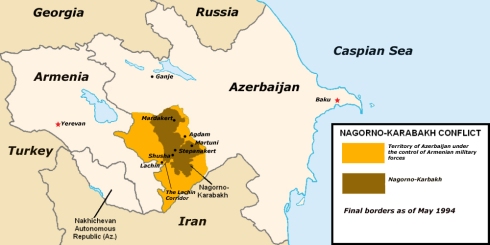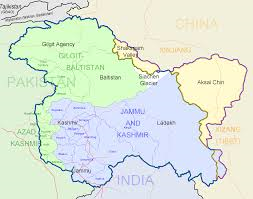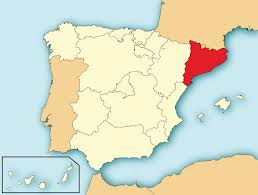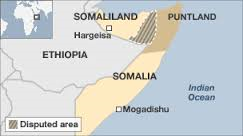1. Armenia vs. Azerbaijan
On 3rd November, Edward Nalbandyan, the Foreign Minister of Armenia, stated the following at a joint press conference with British Minister for Europe, David Lidington, held at the Ministry of Foreign Affairs of Armenia:
“To be against the self-determination right or ignore it is equal to opposing the evolution […] I can state that we have repeatedly noted and stressed that realization of the self-determination right is not a reason for different conflicts, but quite the opposite: hindering and rejecting its implementation creates a corresponding ground for conflicts”.
Azerbaijan did not hesitate to respond:
“The right of peoples to self-determination is one of the core principles of the international law. Politicizing the international law, particularly the principle of self-determination of peoples, and using them for political speculation are unacceptable. Unfortunately, that’s what we’re seeing in Armenia’s experience” […] In general, it is improper to talk about the right of peoples to self-determination in the background of the acts of occupation, aggression and bloody ethnic cleansing committed by Armenia against Azerbaijan”.
Hikmet Hajiyev, spokesperson for Azerbaijan’s Foreign Ministry said that in the UN Charter, the right to self-determination is defined as fight against colonialism and in terms of occupied territories.
Source: http://www.news.az/articles/karabakh/93250
This war of words is related to the conflict between these two countries over the Nagorno-Karabakh region.
2. India vs. Pakistan
India has asserted that the right to self-determination cannot be abused to encourage secession and undermine democratic states, as it called on the international community to be watchful of forces of extreme nationalism.
India also termed as “unacceptable” the attempts that are being continuously made at the UN and elsewhere to reinvent some basic principles of the UN Charter, such as self-determination, and “to apply them selectively for narrow or domestic political ends”.
A Pakistani delegate had earlier raised the issue of Jammu and Kashmir, saying that he regretted that the people of the state had been deprived of their right to self-determination.
These comments come after the growing tensions and claim to self-determination in India’s Jammu and Kashmir region with a Muslim majority population.
3. Catalonia vs. Spain
On 9th November, Catalonia held a non-binding vote on independence, turnout of which was 2,236, 806 people out of the 5.4 million eligible voters with 80.72% “yes” to both questions: whether Catalonia should be a state and whether it should be independent. Just over 10% voted yes for the first question and no for the second and about 4.5% voted no to both questions.
“Once again Catalonia has shown that it wants to rule itself” and “we have earned the right to a referendum” – said Artur Mas, the Catalan leader.
The ballot was held in the face of fierce opposition from the Spanish government.
Nationalism in Catalonia has been fuelled by economic and cultural grievances. The wealthy region of 7.5 million people contributes more to the Spanish economy than it gets back through central government funds.
Source: http://www.bbc.com/news/world-europe-29982960
4. Somaliland vs. Somalia (& the international community)
On 30th October, drawing a parallel between Scotland’s and England’s union, the Somaliland Societies of Europe published a press release and a statement, in which they attempt to justify Somaliland’s right to self-determinaation and secession form Somalia:
“If a 300 year old peaceful and prosperous union of two states has been considered for a possible dissolution through self-determination of the people of one of the states, then the dissolution of a 30 year union of the two states of Somaliland and Somalia in May 1991 after a ‘genocidal’ war waged by the government of the union against the majority of the Somaliland people, and at a time when there were no avenues for the exercise of democracy, let alone internal self-determination, should surely be acceptable to any Somalian government claiming to be the successor to the pre 1991 government”
After the collapse of the central government in the Somali Civil War, Somaliland declared its independence from Somalia in 1991. Somaliland remains unrecognised and is a member of the Unrepresented Nations and Peoples Organization.
Source: http://www.somalilandlaw.com/SSE_PR_on_Statement_on_Somaliland_301014_R2.pdf
General conclusion
These examples demonstrate that claims to self-determination and secession can rise due to several and multiple reasons, e.g. mostly economic in the case of Catalonia, but mostly cultural/religious in the case of Jammu and Kashmir.
These examples also demonstrate that the current law of the right to self-determination is too vague, and is therefore subject to political interpretations, which are fuelling further conflicts.
It has to be admitted that law is always interpreted in different ways, but a more precise law can narrow down the possibility of completely opposing interpretations.
After all, it is not the political leaders’ job to interpret this particular right, principle and law, but a competent judiciary’s, as proposed by this project in this post.



